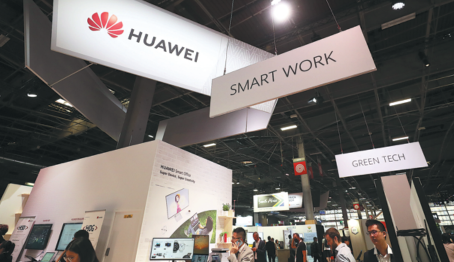Appliance of science to tighten nations' bonds

Chinese expertise to help France boost green credentials in its economy, including construction of infrastructure for hydrogen vehicles
China and France — two firm supporters of multilateralism — are expected to create more jobs, investment and regional connectivity in the next stage of their partnership, enriched by China's opening-up and the "France 2030" investment plan, said officials and business leaders from both sides.
Revealed by the French government in 2021, the "France 2030"investment plan is designed to focus on France's industrial future, according to Business France, a French government agency that promotes the country's exports and attracts foreign investment.
Faced with the challenge of ecological transition, the plan aims to support the transformation of sectors of excellence in the French economy, including auto, aerospace, digital, the green industry, biotechnology, culture and healthcare. It will be worth 30 billion euros ($32.75 billion) over five years.
"The reinforced economic and trade relations between China and France will bring up a beneficial situation as China is a profound market for imports from France. This can pull up local employment and enhance the country's strength in boosting its economy," said Yang Guangbin, dean of the School of International Relations at the Renmin University of China.
He said both countries have more room to expand trade and investment, and deepen cooperation in such fields as high-end manufacturing, modern services, environmental protection, green development and new infrastructure-related businesses in the long term.
Unlike traditional infrastructure such as railways, roads and water courses, the concept of new infrastructure refers to critical facilities based on information technologies like 5G, artificial intelligence, the industrial internet and the internet of things. IoT describes networks of devices that can connect and exchange data.
French industrial software company Dassault Systemes has been heading in that direction. The company said it will create industrial ecosystem chains connecting upstream and downstream segments in key industries, and empower more Chinese companies with technical innovations this year, as it will help them succeed in digital transformation.
The global economy is undergoing various challenges, but it drives growth of the digital economy, said Zhang Ying, managing director for China at Dassault Systemes.
More innovative technical solutions are needed in all industries to meet global challenges. Many industries in China are accelerating digital transformation and they are increasingly recognizing and investing in digitalization. This is the "China opportunity" that Dassault Systemes sees, said Zhang, noting his group achieved a breakthrough and rapid growth in 12 industries in 2022.
For instance, it implemented a liquor production line project in the packaging consumer goods industry. In the construction field, a new-generation weather radar in Wuhan, Hubei province, became the first "paperless" building in China.
"We expect that the industries in which we have advantages like auto, aviation and industrial equipment in the manufacturing industry will maintain a high growth level in 2023," he added.
Zhang said that the new round of high-level opening-up measures pushed forward by China demonstrates the inclusiveness of the Chinese economy, and his company has seen more opportunities for cooperation, innovation and growth with local partners.
Eager to reinforce its competitiveness, Shanghai-based Shenergy Group revealed the world's largest hydrogen-powered mining truck in terms of tonnage early this year, as part of its commitment to building a domestic hydrogen energy manufacturing value chain.
The State-owned company set up a joint venture with Plastic Omnium, a French automotive supplier specializing in the manufacturing and commercialization of plastics, in Shanghai in January. The JV is to manufacture and market type III and IV high-pressure hydrogen storage systems for the commercial vehicle market in China.
The two parties also signed a memorandum of understanding to extend strategic cooperation around building hydrogen ecosystems and contributing to a road map for carbon neutrality in China.
While reducing the carbon footprint of the mining sector is a major task worldwide, the application of hydrogen in the mining sector might develop faster compared with that of private vehicles, as the routes of mining trucks are usually fixed, said Lin Boqiang, head of the China Institute for Studies in Energy Policy at Xiamen University.
CRRC Electric Vehicle, the electric and gas-powered hybrid vehicle manufacturing unit of China Railway Rolling Stock Corp — the country's largest rolling stock manufacturer by production volume — completed a trial run of its bus on open roads in a suburb of Paris in December. It announced in January that it is ready to start official operations with passengers in France this year.
The 12-meter-long self-driving bus features real-time data processing about pedestrians, vehicles and road conditions, ensuring safety and improving driving efficiency, said Peng Zhichuan, director of the automation technology at CRRC Electric Vehicle based in Zhuzhou, Hunan province.
"This marks the first time that a Chinese-made autonomous vehicle has entered the French market," he said, adding the vehicle's body structure is made of high-strength but lightweight steel, which ensures safety.
Unlike road testing conditions in China, the road conditions of France are relatively complex, due to many traffic lights and narrow roads, which demand high accuracy and advanced self-driving solutions, said Yan Zhenhong, deputy general manager of the overseas business department at CRRC Electric Vehicle.
With the world experiencing turbulence and changes, it is of great significance for China and France to jointly uphold multilateralism, enhance political mutual trust and strengthen strategic coordination, said Gao Lingyun, director of the international investment division at the Institute of World Economics and Politics, which is part of the Chinese Academy of Social Sciences.
Given the European Union's ongoing challenges with high energy prices and economic troubles, it is both practical and essential for the EU to strengthen its ties with China and deepen cooperation in the areas of trade and investment, said Gao. He stressed such cooperation can be instrumental in helping the EU overcome its economic challenges and set the stage for sustained growth and prosperity.
Echoing that sentiment, Denis Depoux, global managing director of global consultancy Roland Berger, said the economic relationship between the EU, including France and Germany, and China, is a strong driver of global trade, investment and innovation across multiple sectors. It bears particular importance at a time when the Chinese economy is entering a new era of transformation around industrial modernization and decarbonization, he added.




















